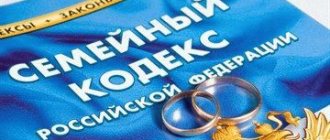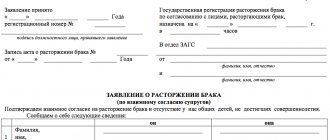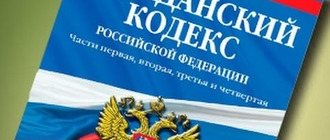Russian legislation, in an effort to protect the interests of every citizen, pays special attention to ensuring the rights of children. A sufficient number of articles of the Family Code of the Russian Federation are devoted to guarantees of safety and the creation of appropriate conditions for any child from birth to adulthood. Protecting the property rights of minors is very important, since a child cannot independently defend the right to own any property. The property rights of a child are often violated, let's not allow careless adults to offend innocent children!
In addition to the rights of minor children established in Chapter 11 of the Code, which consist in the child’s right to live and receive the basics of education in a family, express his opinion, communicate with his father and mother, other relatives, and receive protection, children also have property rights.
Family Code to protect children's interests
The concept of property rights includes parental duty regarding the manifestation of love and care. While fulfilling their maternal and paternal duties in accordance with family law, parents are also obliged to spend a share of their earnings on the needs of the child. Children have the right to receive maintenance from their father and mother (in some situations from other family members) to meet their needs for food, clothing, education, treatment and rehabilitation.
In cases where parents refuse to support a child, the law defines the rules for collecting funds in court.
If the child is due any monetary payments (benefits, pensions or alimony), these funds are transferred to the parents. The latter are obliged to spend these funds in a targeted manner, directing them towards the upbringing, education and general maintenance of the child. If one of the parents transfers alimony and is not sure that the funds are spent for their intended purpose, he has the right to demand that the court that made the decision on the payment of alimony include in the decision a clause on the transfer of no more than half of the alimony amounts to a current account opened in the name of minor child in a bank. The same applies to the property rights of the child.
Violation of the property rights of a minor
Unlike the Convention on the Rights of Children, the Family Code of the Russian Federation provides for the property rights of minor children and sanctions in case of their violation.
Article 60 of the RF IC explains the following: a child is an independent subject endowed with rights to his own property. Parents or persons who replace them have no right to the child’s property. But they are obliged to represent the interests of the child when concluding transactions. Spouses also have the authority to manage the property of a minor.
In the event of a violation of a child’s property rights, intervention by the guardianship and trusteeship authorities is provided in order to control the actions of the violators. In the event that the situation is not resolved peacefully, the property relations of the child and the violators are considered in court.
The age of the child as a criterion for the exercise of rights
The child’s age is related to his ability to independently manage his own property. Being between the ages of 14 and 18, children have the right to manage independently earned funds, scholarships or other income. The child also has the rights of the author to objects created by him in the field of science, literature or other art, inventions and other consequences of the activity of the intellect and creative self-expression. It must be taken into account that such copyrights can be exercised by children without the consent of the father and mother, adoptive parents or persons who are trustees.
The legislator also establishes the possibility for a child of this age to independently carry out small household transactions.
The consent of the father and mother, adoptive parents or trustees is required in cases where the child enters into civil law transactions related to the implementation of the property rights of children.
The rights of young children (the law classifies persons from 6 to 14 years of age as such) include the right to accept gifts, free use of property provided to them, as well as the disposal of so-called “pocket expenses”.
PROTECTION OF PROPERTY RIGHTS OF MINORS IN JUDICIAL PROCEDURE
Children are one of the most vulnerable groups of the population, both in social and legal aspects. In this regard, recently special attention has been paid to the child both as an individual and as a member of society, which gives him certain rights. In Russia it is proclaimed that children enjoy equal legal and social protection, regardless of the origin and civil status of their parents.
In Art. 2 of the Constitution of the Russian Federation enshrines the duty of the state to respect and protect the rights and freedoms of man and citizen. Both the Federation and all its constituent entities, state authorities, local governments, as well as public associations recognized by law operating in the country are called upon to fulfill this responsibility.
In modern conditions, Russia considers itself part of the world community. Among the national mechanisms and means of ensuring human rights and freedoms, the most common is judicial protection. Its principles and forms of implementation are provided for in various international legal acts and in the Russian Constitution, Art. 46 of which provides that decisions or actions of state authorities, local governments, public associations and officials may be appealed to the court. At the same time, everyone is guaranteed the right to receive qualified legal assistance, which in cases provided for by law is provided free of charge (Article 48).
Judicial protection is carried out in accordance with Art. 118 of the Constitution of the Russian Federation through constitutional, civil, administrative and criminal proceedings. We are interested in only some issues of protecting children's rights in the administration of justice in civil cases.
It is necessary to touch upon, first of all, the problems of protecting the property rights of minors. Many authors pay attention to the judicial protection of children's rights. Most often they talk about the protection of the rights of the child arising from family legal relations. Minors aged 14 to 18 years are partially competent. From the age of 16, they can enter into employment contracts and manage their earnings at their own discretion, and can also become members of an agricultural production cooperative. In connection with this, it is currently important to pay attention to the protection of the property rights of minors [1].
The property rights of a child belong to the category of little-studied and ambiguous concepts in legal science. The difficulty is caused by the lack of legislative provisions regulating the property relations of the child as a subject of law. The UN Convention on the Rights of the Child, when considering the personal non-property rights of children, partially affects property relations, Art. 27 of the Convention is limited to provisions on the obligations of parents to provide for the child within the limits of their financial capabilities. The Convention does not even mention the child's property rights. In Russian legislation, Art. 60 of the RF IC, which pays minimal attention to them and repeatedly refers to civil legislation. The Civil Code expands the list of property rights of minors, devoting two articles to them, but does not provide a complete list.
Based on all this, we can conclude that the identified problem is not regulated in any way. In this matter, one should be guided by the Constitution of the Russian Federation, which applies to all citizens of the Russian Federation, including minors. Thus, we can get a complete picture of the property rights of minors by considering the norms of the Civil, Family, Land Codes, the Constitution of the Russian Federation, as well as other norms of federal legislation.
Having outlined some development of the issues of protecting the rights of minors arising from family legal relations, we will touch upon the problems of maintaining the rights of a child to a share of family property, especially real estate.
According to paragraph 4 of Art. 60 of the RF IC, children do not have the right of ownership of the property of their parents, just as parents do not have the right of ownership of the property of their children. Children and parents living together have the right to own and use each other's property. A child who has his own property in accordance with paragraph 3 of Art. 60, i.e. inherited, gifted, has the right, upon reaching the age of 14, to contribute it to the family budget, acquiring ownership of the corresponding share of family property.
Until the age of 14, the child’s property is managed by the parents.
If parents abuse their rights, the guardianship and trusteeship authorities have the right to file a lawsuit to limit parental rights to manage the specified property and transfer this property to trust management. If the parents refuse to recognize the child's ownership rights to a share in the family property, the child may apply for protection of his property rights and interests protected by law to the guardianship and trusteeship authorities or to the commission for the protection of the rights of minors. Disputes regarding the determination of a child’s share in the family’s common property are considered in court.
According to the law, minors can participate in civil proceedings only through legal representatives. From 14 to 18 years of age, the court is obliged to involve minors themselves in such cases. According to judicial practice, when considering disputes involving minors aged 14 to 18 years, the legal representative is a party to the proceedings. Consequently, the minor himself as a party has no procedural rights. He cannot take advantage of special rights, for example, in lawsuit proceedings. However, the mandatory presence of them in the process emphasizes the need for the court to find out from minors their personal opinions on the issues under consideration.
The legislator further notes that in cases provided for by federal law, in cases arising from civil, family, labor, public and other legal relations, minors (from 14 to 18 years old) have the right to independently protect their interests, and legal representatives can be invited to the process . Since the norm does not clearly indicate the procedural position of the participants, we do not find an answer to the question of who in this case is a party to the lawsuit: the minor himself or his legal representative. Having analyzed the law, it seems possible for us to conclude that it is minors who need to be recognized as a party to the process. Legal representatives can give consent to a particular civil procedural statement or action. Moreover, with the help of the phrase “the court has the right to involve...” the legislator managed to emphasize the optional presence of parents (persons replacing them) during the administration of justice in civil cases.
I would also like to pay attention to the fact that, according to family law, parents have equal rights to the child, and, as a result, both parents can represent his interests in civil proceedings. In practice, situations are possible when the interests of children are infringed by one of the legal representatives. At the same time, it is difficult to protect the interests of minors, since one of the parents (persons replacing them) is not interested in an objective consideration of the case and the formation of an evidence base. As a result, the interests of the child may suffer. To eliminate the problem that has arisen, we propose to provide each minor participant in civil proceedings with free legal assistance, regardless of the presence of legal representatives and guardianship authorities in the process. This will serve as a criterion for high-quality protection, which is important in a competitive process. This assistance can be paid for from the federal budget.
Vagueness in the institution of legal representation can give rise to other problems in the administration of justice in civil cases. An example of this is the use of special rights by a party to civil proceedings. Let us assume that the child’s parents do not reach mutual agreement on the issue of concluding a settlement agreement, changing the subject and basis of the claim. Having equal parental rights, they can claim to have their views taken into account on protection issues.
We can draw the following conclusion: in order to prevent possible disagreements, it would be worth submitting evidence of the consistency of the legal position of the legal representatives into the process. This circumstance could serve as an additional guarantee in ensuring the rights and legitimate interests of children in the administration of justice in civil cases.
Bibliography
1. Civil Code of the Russian Federation (Part One) dated November 30, 1994 No. 51-FZ (as amended on December 3, 2012) // Collection of Legislation of the Russian Federation, December 5, 1994, No. 32, Art. 3301.
2. “Convention on the Rights of the Child” (approved by the UN General Assembly on November 20, 1989) (came into force for the USSR on September 15, 1990).
3. Constitution of the Russian Federation: adopted at a national referendum on December 12, 1993: as amended, introduced. Laws of the Russian Federation on amendments to the Constitution of the Russian Federation of December 30, 2008 No. 6-FKZ and No. 7-FKZ // Collection of legislation of the Russian Federation. – 2009. – No. 4, art. 445.
4. Family Code of the Russian Federation dated December 29, 1995. No. 223-FZ: adopted by the Federal State Duma. Meetings of the Russian Federation 12/8/1995: ed. Federal Law of the Russian Federation dated November 12, 2012 No. 183-FZ // Ros.gaz.2012. 15 Nov
Judicial protection of children's rights
The law provides for minor citizens the right to independently protect their own interests in court (subject to emancipation - recognition of the child as fully capable in the manner prescribed by law). In other cases, the protection of property rights in court is carried out by their legal representatives. This implementation is quite effective.
It should be noted that the emergence of a controversial situation involving a young or minor child can become a traumatic factor for the child’s psyche. Contacting specialists to obtain comprehensive legal advice can help minimize the possible negative consequences of family property and non-property disputes.
Child's right to inheritance
The right to inheritance does not depend on age, and when the right to inheritance arises among a group of relatives, the right to inheritance of minor heirs is no different from the right to inheritance of adults. The inheritance is divided in the interests of all heirs, including minors. Minor heirs inherit both by law and by will. The children of the testator, together with his spouse and parents, are the heirs of the first stage. That is, in accordance with paragraph 1 of Art. 1142, para. 1 tbsp. 1167 of the Civil Code of the Russian Federation, the property of the testator is inherited in equal shares among all heirs of the first priority.
If minor children are not among the heirs of the first priority, they divide the inheritance in accordance with the order of inheritance according to the law.
If the testator left a will, regardless of its contents, the minor heirs along with the testator’s disabled children, as well as his adopted children, in accordance with paragraph 1 of Art. 1149 of the Civil Code of the Russian Federation, have the right to a mandatory share of the inheritance, which will be at least half of the share due to the heirs by law. They receive this share regardless of the contents of the will. Hence, according to paragraph 2 of Art. 1149 of the Civil Code of the Russian Federation, heirs who have an obligatory share of the inheritance receive it from the part of the inherited property that remains untested. Moreover, in accordance with paragraph 2 of Art. 1149 of the Civil Code of the Russian Federation, the right to this part of the property of the heirs under the will and their share may decrease.
Previous post Is it possible to waive parental rights and responsibilities
Next entry Can a minor live separately from his parents, guardians or guardians?
The grandmother gave her eleven-year-old grandson Fedya a house in her home village. There were dishonest people who, secretly from Fedya’s parents, offered him to sell the house, from the child’s point of view, “for a lot of money.” He could buy a motorcycle with it. However, the scammers did not succeed: the purchase and sale agreement was not registered. “But the house belongs to the boy,” the dodgers protested. “The child does not have sufficient legal capacity,” explained the notary’s office. “He has no right to enter into such agreements.”
What is required for citizens (individuals) to participate in civil legal relations? They must have legal capacity, legal capacity and capacity to act.
Civil capacity
- this is the ability recognized by law to have civil rights and bear responsibilities, to be protected by the law. It applies equally to all citizens from birth and ends with their death. For example, an infant may be the owner of a house, apartment, bank deposit, etc.
The Civil Code of the Russian Federation determines that citizens may own property; inherit and bequeath property; engage in entrepreneurial and any other activities not prohibited by law; create legal entities independently or jointly with other citizens and legal entities; make any transactions that do not contradict the law and participate in obligations; choose a place of residence; have the rights of authors of works of science, literature and art, inventions and other results of intellectual activity protected by law; have other property and personal non-property rights (Article 18).
Civil capacity
- this is the ability of a citizen, through his actions, to acquire and exercise civil rights, create civil responsibilities for himself and fulfill them. It arises in full with the onset of adulthood, that is, upon reaching the age of 18 (Article 21). Minors aged 14 to 18 years, as well as minors aged 6 to 14 years, are endowed with partial legal capacity. Children under 6 years of age do not have civil capacity.
Incapacitated citizens
can only be recognized by a court decision if, due to a mental disorder, they are unable to understand the meaning of their actions or control them.
Those who, due to the abuse of alcoholic beverages or drugs, put their family in a difficult financial situation, may be limited in their legal capacity
(they are allowed to carry out only small household transactions).
A citizen under 18 years of age acquires full legal capacity from the time of marriage. The legal capacity acquired as a result of marriage is retained in full even in the event of divorce before reaching the age of 18.
A capable citizen has the right to engage in entrepreneurial activity without forming a legal entity from the moment of state registration as an individual entrepreneur; he is liable for his obligations with all the property belonging to him, with the exception of property that cannot be foreclosed on in accordance with the law.
Speaking about the partial legal capacity of minors aged 14 to 18 years
, the Civil Code of the Russian Federation (Article 26) means that they enter into transactions with the written consent of their legal representatives - parents, adoptive parents or trustee. A transaction made by such a minor is also valid with its subsequent written approval by his parents, adoptive parents or guardian. Independently, without the consent of parents, adoptive parents and guardians, minors aged 14 to 18 years have the right to:
• manage your earnings, scholarships and other income;
• exercise the rights of the author of a work of science, literature or art, invention or other result of his intellectual activity protected by law;
• in accordance with the law, make deposits in credit institutions and manage them;
• make small household transactions. Upon reaching 16 years of age, minors are also eligible to be members of cooperatives in accordance with cooperative laws.
Minors aged 14 to 18 years independently bear property liability for transactions concluded by them. They are liable for the damage they cause in accordance with the Civil Code of the Russian Federation.
If there are sufficient grounds, the court, at the request of parents, adoptive parents or a trustee or a guardianship authority, may limit or deprive a minor aged 14 to 18 years of the right to independently dispose of his earnings, scholarship or other income.
The Civil Code of the Russian Federation (Article 27) allows minors who have reached the age of 16 to obtain full legal capacity as a result of the so-called emancipation
. He can be declared fully capable if he works under an employment contract, including a contract, or with the consent of his parents, adoptive parents or guardian is engaged in entrepreneurial activity. Emancipation is carried out by decision of the guardianship and trusteeship authority - with the consent of both parents, adoptive parents or trustee, or in the absence of such consent - by court decision. Parents, adoptive parents and trustees are not liable for the obligations of an emancipated minor.









